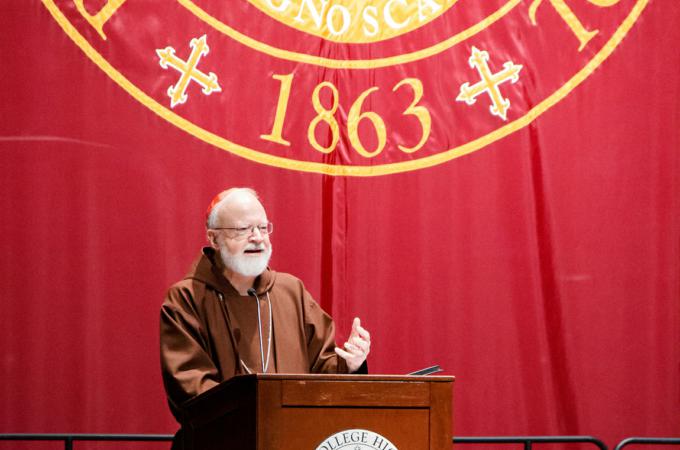Cardinal announces new social justice ministry at convocation
BOSTON -- The 10th annual Social Justice Convocation held Nov. 17 at Boston College High School included keynote speakers, a panel discussion, networking breaks, and an announcement from Cardinal Seán O'Malley about the creation of a new Archdiocesan Social Justice Ministry.
The morning started with a Mass celebrated by Father J. Bryan Hehir, the archdiocese's Cabinet Secretary for Health and Social Services. Father Hehir also offered the day's first keynote address, speaking on the topic of "Megatrends in Catholic Social Justice."
In his talk, Father Hehir outlined the core values of Catholic social teaching and explained their connection to Pope Francis' greatest social concerns: inequality, immigration, and the environment.
Father Hehir said that although Catholic teaching does not have its own school of economics or political science or international relations, "What it has is a vision of what the world ought to be." With this guiding vision, he said, one must address how the world really is.
He described Catholic social thought as a series of concentric circles. At the center are belief in human dignity, which comes from being made in the image of God; human rights, which result from that inherent dignity; and the social nature of the person, which is why people depend on multiple communities.
"In every political conflict in our world today, in our country today, each and all of them would move toward resolution if we really honored the dignity of every person," Father Hehir said, adding that "the dignity of the human person is where we start and where we always will return."
Father Hehir's address was followed by Darlene Lombos, Executive Director of Community Labor United, speaking about "Advancing Justice in the Workplace." CLU was founded by the Greater Boston Labor Council in 2005.
Lombos said CLU operates on the belief that the separation of labor and community is a construct that benefits corporations, and that working-class communities and communities of color need to be at the forefront of the labor movement.
She explained that CLU uses joint organizing campaigns to challenge corporations, bridge the divide between community and labor, and build grassroots leadership. Past campaigns have been successful in passing municipal ordinances to protect workers' rights and creating fair contracts that benefit communities, unions, and the environment.
For the past four years, CLU has been campaigning for the prevention of wage theft, which Lombos said is a problem in many industries and most common in construction. Lombos showed two short videos highlighting the work of Community Labor United.
The final keynote speaker was Patrick Laorden, Social Justice Coordinator for the Archdiocese of Hartford's Office of Catholic Social Justice Ministry. He shared a slideshow presentation on "Perspectives from the Younger Generation," drawing on his personal experience as well as the recent Synod on Young People, the Faith, and Vocational Discernment.
Laorden pointed to the image of Jesus appearing to two disciples on the road to Emmaus as a lesson in accompaniment. He encouraged what Pope Francis calls forming "a culture of encounter."
"For the younger generation, responding to the signs of the times means meeting where we're at," he said.
Laorden drew a distinction between "social justice," which can sound political, and "Catholic social justice," which is rooted in values drawn from the life of Christ, the sacraments, the social encyclicals, and Church teaching.
He said that action is often emphasized in social justice ministry, neglecting the need for reflection and education. He identified relationship building and storytelling as "cornerstones" of social justice ministry.
"Self-identity, community and meaning are values that are dear to the young generation and things that we struggle to find or build up. These values are cultivated through our one-on-ones and sharing stories," Laorden said.
He added, "Never underestimate what the young are capable of doing."
During the convocation's panel discussion, representatives from St. Katherine Drexel parish in Roxbury, St. Cecilia parish in Boston, and Sacred Heart/St. Brigid in Lexington shared how they formed and sustained social justice ministries in their respective communities.
Following a networking break for attendees to meet the exhibitors from various organizations, facilitators led small groups discussions about what they had learned and what commitments they felt called to make.
Cardinal O'Malley delivered the day's closing remarks.
He recalled visiting a refugee camp in El Salvador during the civil wars there. There, he said, he was surrounded by thousands of starving people. He noticed a field of cattle and asked if they were going to be used to feed the people. He found out the livestock were being raised in order to produce dog food for the United States.
"It certainly is a crisis of values. Money has become more important than people," he said.
He spoke of what Pope Francis calls "the globalization of indifference."
"This convocation reminds us that we can never forsake the ministry of pursuing justice and building peace in our communities and our country and our world," the cardinal said.
Looking back on the origins of the annual convocation, Cardinal O'Malley credited Patricia Dinneen for conceiving of the convocation and being part of the team of volunteers who organize it each year.
He then announced that he has accepted the recommendation of Dinneen and Father Hehir to establish an Archdiocesan Social Justice Ministry, and has asked Dinneen to chair it. This council will provide him with recommendations for responding to a wide range of social issues.
Speaking to the Pilot after the convocation adjourned, Dinneen expressed her enthusiasm at the creation of the Social Justice Ministry.
"It's not just an office; it's a way of life," she said.
"There are so many people around the world who are working individually on different social justice issues. But as Pope Francis tells us in 'Laudato Si,' everything is interconnected. So if we can come together, as a council, reporting directly to Cardinal Seán, we can start seeing those interconnections, build bridges, and find what unites us, not what divides us," Dinneen said.



















